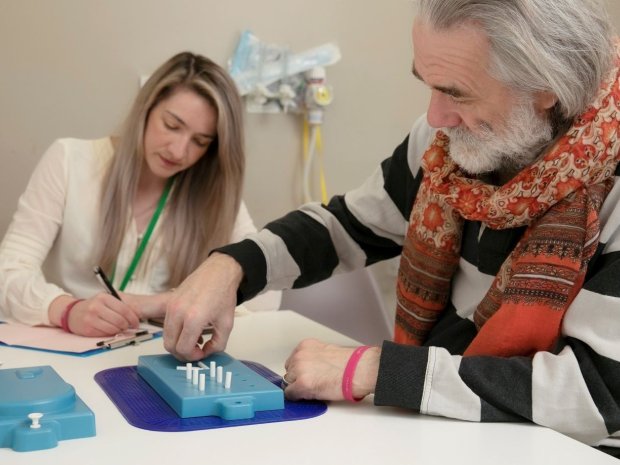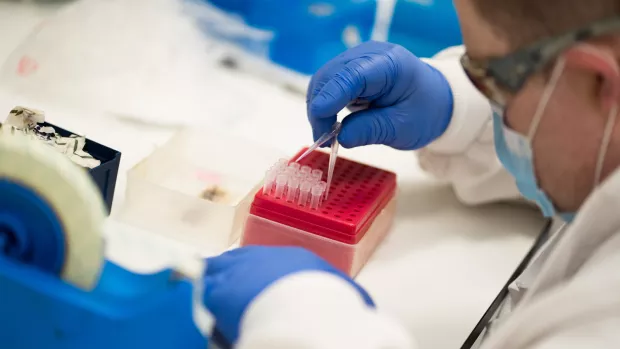
The clinical trials taking us closer to stopping MS
To help people at every stage of MS, we need to stop MS from progressing. Researchers are looking at three ways to do this. And we’ve now reached the point where there are clinical trials in progress for all three, as well as work to speed up how quickly we can test potential treatments.
Can we prevent immune attacks at every stage of MS?
In MS, immune cells attack the protective myelin coating around our nerves. We’ve made incredible progress in our ability to stop the immune system attacking myelin. There are now more than a dozen disease modifying therapies (DMTs) available for relapsing MS that help do this. And we’re starting to make headway in progressive MS as well.
Ocrelizumab is now available for people with early progressive MS. And in 2020, siponimod was approved for use on the NHS as the first oral treatment for people with active secondary progressive MS.
But to make sure everyone with MS has access to effective treatments, we need to know whether targeting the immune system can still be effective at more advanced stages of MS.
ChariotMS
Traditionally, walking ability has been the main measurement of whether a drug is effective. So, many people who use wheelchairs have been unable to take part in MS trials. But now, new trials are exploring whether drugs that target the immune system are able to slow down the worsening of hand and arm function for people with advanced progressive MS.
A trial called ChariotMS is testing whether cladribine, a drug already used to treat relapsing MS, can do the same. ChariotMS is currently recruiting people with advanced progressive MS.
If you have advanced progressive MS and an EDSS (Expanded Disability Status Scale) score of 6.5 to 8.5, the researchers want to hear from you.
Find out how to get involved with ChariotMS
Promising results from myelin repair studies
Our bodies have an amazing natural ability to repair myelin. But this repair becomes less effective over time and doesn’t work as well as it should in MS. Researchers are exploring ways to kick-start this natural process again.
In September 2020 results from our bexarotene clinical trial showed myelin repair is possible in humans. Unfortunately, participants in the trial experienced some serious side effects, which means bexarotene won’t be taken forward into further trials.
Metformin and clemastine
But now a trial of the diabetes drug metformin is building on this work. Promising results from laboratory studies showed metformin could repair myelin in rats. Our trial, led by Professor Alasdair Coles at the MS Society Cambridge Centre for Myelin Repair, is testing whether metformin in combination with clemastine (an antihistamine) can repair myelin in people with relapsing MS.
The metformin and clemastine trial is recruiting 50 people with relapsing MS. Participants will be recruited from Addenbrooke’s Hospital in Cambridge and other nearby hospitals.
Testing treatments to protect nerves from damage
As well as playing a vital role in how nerves work, myelin also protects them from damage. Without their protective myelin, nerve cells are vulnerable. So we need to make sure our nerves are happy, healthy and protected from damage.
MS-STAT2
Previous research has suggested that simvastatin, a drug initially developed to lower cholesterol, was also able to improve levels of disability and slow disease progression in MS.
We’re now co-funding MS-STAT2, the final definitive trial to show whether simvastatin can slow progression in secondary progressive MS by protecting nerves from damage.
MS-STAT2 completed recruitment in late 2021. The trial will continue for another three years and then there will be a period of data analysis before results are announced.
Speeding up clinical trials with Octopus
With every step of our plan to stop MS underway, we believe treatments that slow or stop disability progression for everyone with MS are now a very real prospect.
Our next project is to speed up how quickly we can run trials. That’s the job of our game-changing multi-arm, multi-stage trial, Octopus. Octopus’ novel design will enable us to test multiple drugs at once, and add in new ones as soon as they’re discovered.
Right now, the trial team are working hard to get hospital sites around the UK ready for people with primary and secondary progressive MS to take part in Octopus.
This blog was updated in March 2023 to reflect the latest information about the trials.



